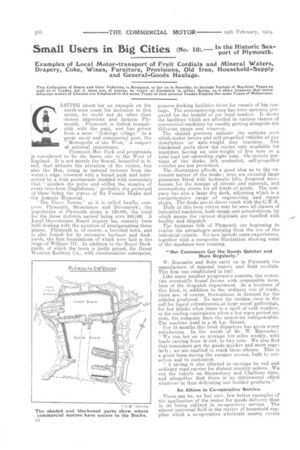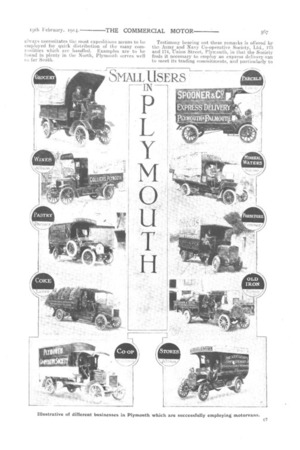Small Users in Big Cities (No. 10). In the Historic Seaport of Plymouth.
Page 12

Page 13

If you've noticed an error in this article please click here to report it so we can fix it.
Examples of Local Motor-transport of Fruit Cordials and Mineral Waters, Drapery, Coke, Wines, Furniture, Provisions, Old Iron, Household-Supply and General—Goods Haulage.
This Collection of Users and their Vehicles, is Designed, so far as is Possible, to Include Variety of Machine Types as well as of Trades, but it must not, of course, be taken as Complete in either Sense, as it often happens that many different makes of Chassis are Employed in the same Trade or that several Trades Employ the same Types of Motorvans.
ASTING about for an example on the south-west. coast for inclusion in this series, we could not do other than choose important and historic Plymouth. Plymouth is linked inseparably with the past, and has grown from a mere "fyshinge " to a great naval and commercial port, the "Metropolis of the West," a seaport of national importance. Plymouth Hoc Park and promenade is considered to be the finest site in the West of England. It is not merely the Sound, beautiful in itself, that attracts the attention of the visitor, but also the Hoe, rising in natural terraces from the water's edge, crowned with a broad park and intersected by a wide promenade studded with memorials that " quicken the pulse and stiffen the muscles of every true-born Englishman," probably the principal of these being the statue of Sir Francis Drake and the Armada Memorial.
" The Three Towns," as it. is called locally, comprise Plymouth, Stonehouse and Devonport; the population of Plymouth alone is 120,000, the total for the three districts named being over 200,000. A Local Government Board inquiry has recently been held dealing with the question of amalgamating these places. Plymouth is, of course, a fortified town, and is also famed for its extensive harbour and dockyards, the first foundations of which were laid in the reign of William M. In addition to the Royal Dockyards, of which the town is justly proud, the Great Western Railway Co., with commendable enterprise possess docking facilities there for vessels of big tonnage. The accompanying map has been specially prepared for the benefit of our local readers. It shows the facilities which are afforded to various classes of commercial machines for readily getting alongside the different quays and wharves. The shaded portions indicate the sections over which motor lorries and self-propelled vehicles of any description or axle-weight may traverse. The blackened parts show the routes only available for machines having an axle-weight of five tons or a total load not exceeding eight tons. On certain portions of the docks, left unshaded, self-propelled vehicles are not permitted.
The illustration affords a good idea as to the extensive nature of the docks ; here are situated large granaries fitted with hydraulic lifts, fireproof warehouses for the storage of nitrate and minerals, and commodious stores for all kinds of goods. The company has also a. large dry dock, adjoining which is a comprehensive range of engineering and repair shops. The docks are in direct touch with the G.W.R.
Daily at this busy centre may be seen all classes of industrial machines, both steam and petrol-driven, by which means the various shiploads are handled with facility and dispatch. The business folk of Plymouth are beginning to realize the advantages accruing from the use of the industrial vehicle. We now include some experiences, together with a composite illustration showing some of the machines now running.
"Our Customers Get the Goods Quicker and More Regularly."
W. Biseombe and Sons carry on in Plymouth the manufacture of mineral waters and fruit cordials. This firm was established in 1857.
Like many another progressive concern, the motorvan eventually found favour with responsible members of the despatch department. In a business of this kind, in addition to the ordinary run of trade, there are, of course, fluctuations in demand for the articles produced. To meet the sudden rises in the call for liquid refreshments at large social gatherings, for hot drinks when there' is a spell of cold weather, or for cooling equivalents when a hot-wave period ensues, the company finds the motorvan indispensable. The machine used is a 25 h.p. Simms.
For 13 months this fresh departure has given every satisfaction. In the words of Mr. W. Biscombe " We run her on an average 140 miles weekly, with loads varying from 35 cwt. to two tons. We also find that consumers get the goods quicker and more regularly; we are enabled to reach them oftener. This is a great boon during the summer season, both to ourselves and to customers.
"A saving is also effected in carriage by rail and ordinary road carrier for distant country orders. Wo run the vehicle on Shrewsbury and Challiner tires, and altogether find there is no 'detrimental effect whatever in thus delivering our bottled products."
An Albion in Co-operative Service.
There can be, we feel sure, few better examples of the application of the motor for goods delivery than in its being utilized in co-operative service. The almost universal field in the matter of household supplies which a co-operative wholesale society covers always necessitates the most expeditious means to be employed for quick distribution of the many commodities which arc handled. Examples are to be found in plenty in the North, Plymouth serves well so far South. Testimony bearing out these remarks is offered by the Airay and Navy Co-operative Society, Ltd., 173 and 174, Union Street, Plymouth, in that the Society finds it necessary to employ an express delivery-van to meet its trading commitments, and particularly to






















